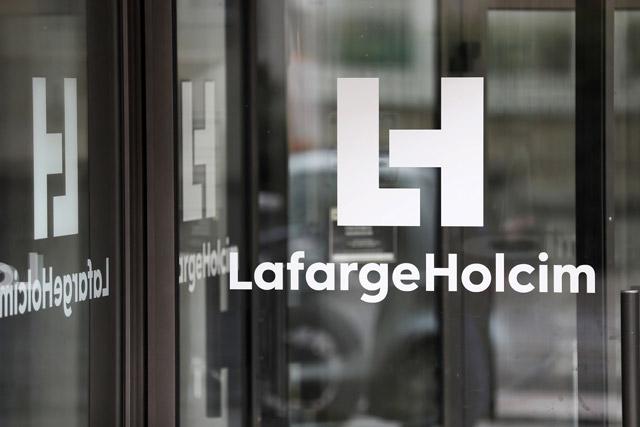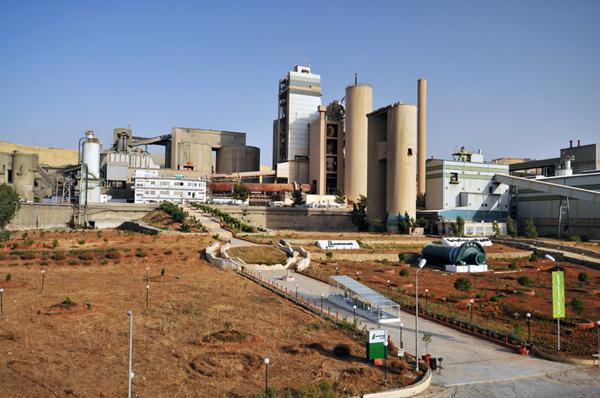You are here
LafargeHolcim CEO to step down over Syria probe
By AFP - Apr 24,2017 - Last updated at Apr 24,2017

This photo taken on March 9 shows the company’s logo at an entrance of the French headquarters of LafargeHolcim, a group created in 2015 by the merger of French cement manufacturer Lafarge and its Swiss counterpart Holcim (AFP photo)
ZURICH — French-Swiss cement maker LafargeHolcim said on Monday its chief executive Eric Olsen is stepping down following an internal investigation into the company’s activities in Syria.
His resignation will be effective on July 15, LafargeHolcim said in a statement, adding that its board had agreed to his departure even though an internal probe had determined he was not responsible for any wrongdoings.
Olsen’s departure follows an inquiry into the indirect financing by Lafarge of armed groups in civil war-ravaged Syria to keep one of its cement plants operational.
“My decision is driven by my conviction that it will contribute to addressing strong tensions that have recently arisen around the Syria case,” said Olsen.
“While I was absolutely not involved in, nor even aware of, any wrongdoings I believe my departure will contribute to bringing back serenity to a company that has been exposed for months on this case,” he added.
‘Unacceptable practices’
Last month, LafargeHolcim admitted that it had resorted to “unacceptable practices” to continue operations at one of its now-closed factories in Syria, and on Monday it said an internal probe had confirmed that finding.
The admission came after sources close to the case told AFP in January that the French government had filed a legal complaint against Lafarge for buying oil in Syria to power the Jalabiya factory, in violation of sanctions.
French cement maker Lafarge bought the factory in 2007 and invested some $680 million to get it working by 2010, representing the biggest foreign investment in the country outside the petroleum sector.
The plant, located in northern Syria some 150 kilometres northeast of Aleppo, was finally evacuated in 2014, and closed down before Lafarge merged with its Swiss competitor Holcim in 2015.
Lafarge is suspected of sourcing oil locally to operate the factory in defiance of a 2012 EU ban on purchases of Syrian oil as part of a sanctions package targeting the regime of Syrian President Bashar Assad.
According to an investigative piece published in French daily Le Monde last June, Lafarge entered into deals with armed groups in Syria, including the Daesh terror group, to protect its business interests there.
On Monday, LafargeHolcim published findings from an independent, internal investigation into the plant, commissioned by its board.
“A number of measures taken to continue safe operations at the Syrian plant were unacceptable, and significant errors of judgement were made that contravened the applicable code of conduct,” it said.
“The findings also confirm that, although these measures were instigated by local and regional management, selected members of group management were aware of circumstances indicating that violations of Lafarge’s established standards of business conduct had taken place,” it added.
It stressed though that its internal investigation had “concluded that Eric Olsen was not responsible for, nor thought to be aware of, any wrongdoings that have been identified as part of its review.”
Never again
The company, which said it would begin searching for Olsen’s successor “immediately”, said it had taken “remedial measures”, including the creation of an “Ethics, Integrity and Risk Committe” to strengthen and enhance compliance with its ethics rules.
Chairman of LafargeHolcim’s board Beat Hess, who is set to temporarily take over the chief executive seat after Olsen’s departure, stressed on Monday that “we are absolutely committed to ensuring that events like those that occurred in Syria must never happen again at LafargeHolcim”.
Related Articles
PARIS — A French appeals court confirmed Wednesday a charge of complicity in crimes against humanity against the cement group Lafarge over a
AMMAN — Construction of a 15-megawatt solar power plant to power Lafarge’s Rashadiya cement plant will begin early next year, Lafarge said o
AMMAN –– Lafarge Jordan has a plan to turn its dusty site for cement production in Fuheis into an "environment-friendly urban hub", but is s

Opinion
Feb 19, 2025
- Popular
- Rated
- Commented
Feb 19, 2025
Feb 18, 2025
Feb 19, 2025
Newsletter
Get top stories and blog posts emailed to you each day.















